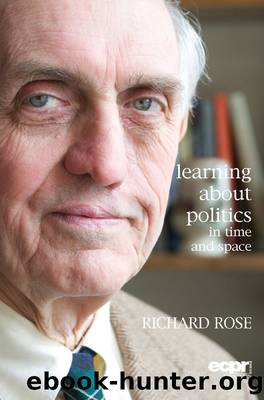Learning About Politics in Time and Space by Richard Rose

Author:Richard Rose [Rose, Richard]
Language: eng
Format: epub
Tags: Essays, History & Theory, Biography & Autobiography, Political Science, General, Social Scientists & Psychologists
ISBN: 9781907301476
Google: nOQkAgAAQBAJ
Goodreads: 18961526
Publisher: ECPR Press
Published: 2013-11-15T00:00:00+00:00
Chapter 7
Northern Ireland: Nothing Civil About Civil War
Unlike many people who write about Irish politics, I have no family connections with Ireland, North or South. At Johns Hopkins I had read the plays of Synge, OâCasey and Yeats with interest, and the writings of James Joyce. My only contact on the ground was hitchhiking around Ireland in the very quiet summer of 1954 with my LSE theatre-going companion. The Abbey Theatre was then, as my Hopkins professors had told me, in the hands of didactic bigots. We walked out in the middle of a play. One afternoon an older Irishman in a German car gave us an adventurous ride across unmarked paths in the hills of Wexford where he had been out in the 1920s. âOutâ was a code word for having been in one or another Republican army. Near Sligo a Catholic priest stopped to show us William Butler Yeatsâ grave. Under bare Ben Bulbenâs head it had the epitaph: âCast a cold eye on life, on death; horseman, pass byâ. The moral the priest drew about this Nobel prize-winning Protestant was: âPoor man, he had nothingâ. In a youth hostel near Galway a Jesuit novitiate told me with pride how his uncle had fought for Franco in the Spanish Civil War and why it was a good thing that James Joyceâs Ulysses was banned in Ireland. I learned how the law was enforced in the West of Ireland when a member of the Garda (the police force) expressed regret that we hadnât tasted the local pride, poâteen, that is, illegally distilled whisky. Northern Ireland was only seen in transit back to a ferry heading for Britain.
Writing Politics in England made me conscious of the need to qualify a number of generalizations with the statement âexcept for Irelandâ. This was particularly true for the chapter about legality and legitimacy; it was weak both theoretically and empirically. I had absorbed enough of Wittgenstein to conclude that there was no point in debating what words âreallyâ meant. However, I could research legitimacy empirically in what was then a totally neglected part of the United Kingdom, Northern Ireland. My goal was to explain why political institutions that were fully legitimate in England were only partially legitimate in Northern Ireland.
The whole of the island of Ireland had been part of the United Kingdom until 1921. However, the predominantly Catholic population rejected the legitimacy of British rule while the Protestant population, which was in the majority in the North of Ireland, was committed to maintaining the Union with Britain. Both sides appealed to arms. The Fenians, founded in Ireland and the United States in 1858, had the avowed purpose of achieving Irish independence by force. In response Unionists adopted the motto suggested by Winston Churchillâs politician father in 1886, âUlster will fight and Ulster will be rightâ. In 1916 Irish Republicans launched an armed insurrection against British rule. Five years of fighting followed between the British Army, Irish Republicans, and Ulster Unionists. In 1921
Download
This site does not store any files on its server. We only index and link to content provided by other sites. Please contact the content providers to delete copyright contents if any and email us, we'll remove relevant links or contents immediately.
The Secret History by Donna Tartt(19088)
The Social Justice Warrior Handbook by Lisa De Pasquale(12190)
Thirteen Reasons Why by Jay Asher(8910)
This Is How You Lose Her by Junot Diaz(6887)
Weapons of Math Destruction by Cathy O'Neil(6280)
Zero to One by Peter Thiel(5802)
Beartown by Fredrik Backman(5754)
The Myth of the Strong Leader by Archie Brown(5507)
The Fire Next Time by James Baldwin(5446)
How Democracies Die by Steven Levitsky & Daniel Ziblatt(5219)
Promise Me, Dad by Joe Biden(5153)
Stone's Rules by Roger Stone(5088)
A Higher Loyalty: Truth, Lies, and Leadership by James Comey(4964)
100 Deadly Skills by Clint Emerson(4925)
Rise and Kill First by Ronen Bergman(4789)
Secrecy World by Jake Bernstein(4753)
The David Icke Guide to the Global Conspiracy (and how to end it) by David Icke(4720)
The Farm by Tom Rob Smith(4513)
The Doomsday Machine by Daniel Ellsberg(4490)
